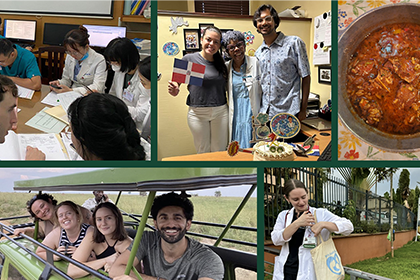Since the Global Health Program’s inception, more than 120 medical students from the Larner College of Medicine have participated—most recently: Uganda (Sarah Chiavacci ’27, Annie Lindholm ’27, and Ben Sebuufu ’27); Vietnam (Martin Briche ’27, Max Pendleton ’27, Curtis Plante ’27, and Eunice Suberu ’27); and the Dominican Republic (Arya Kale ’27 and Estefania “Stefa” Obando ’27).

Clockwise from top left: Max Pendleton (front left) in Vietnam; Estefania Obando (left) and Arya Kale (right) in the DR; asopao in the DR; Sarah Chiavacci in Uganda; Sarah Chiavacci (second from right) with fellow medical students in Uganda
The Global Health (GH) Program is a collaborative effort between Danbury, Connecticut–based Nuvance Health and the University of Vermont Larner College of Medicine that centers on international partnerships in sites around the world. The program focuses on improving patient care and medical education through cooperation and the exchange of ideas, and offers close engagement in the cultural and educational exchange that characterizes global health. By exposing students to different health care systems and socioeconomic structures, the program aims to give an understanding of the challenges in providing and improving patient care in partnership countries.
The GH Program was started at Danbury Hospital (later Nuvance Health) in 2012 by founding director Majid Sadigh, M.D., who at the time was a UVM clinical associate professor of medicine. The GH Program and the Larner College of Medicine established several international partner sites—in Uganda, the Dominican Republic (DR), and Zimbabwe—with other sites, such as Vietnam, Thailand, India, Botswana, and Armenia, joining later. These international partnerships make the Nuvance Health GH Program uniquely positioned to offer six-week-long GH electives to medical students. All international partnerships are based on the founding principles of mutual respect and reciprocity, cultural sensitivity, bi-directionality, equity and inclusivity, and sustainability. Today, the program provides collaborative partnership to support global health learning and elective opportunities for students, residents, and staff.
“Majid has inspired us, a new generation in the field of global health. We are his offspring, and must continue the work in earnest to honor him and continue the pursuit of justice and health equity he so strongly believes in,” said Nuvance Health Global Health Academy faculty member and Larner Clinical Associate Professor of Medicine Stephen Scholand, M.D., who met Sadigh as a young attending physician at a community hospital ward in central Connecticut when the Global Health Program was in development. “Majid was always passionate about serving the underserved, shining a light where it was necessary, and working tirelessly toward those goals,” Scholand said.
Since the program’s inception, more than 120 medical students from the Larner College of Medicine have participated in global health experiences across the various sites.
Most recently, Larner medical students participated at three sites: Uganda (Sarah Chiavacci ’27, Annie Lindholm ’27, and Ben Sebuufu ’27); Vietnam (Martin Briche ’27, Max Pendleton ’27, Curtis Plante ’27, and Eunice Suberu ’27); and the Dominican Republic (Arya Kale ’27 and Estefania “Stefa” Obando ’27).
Reflecting on his medical studies abroad in Vietnam, Pendleton noted, “The skills and perspectives I learned while seeing how physicians and health care workers navigate the health care system in Vietnam broadened my knowledge of what it means to be a great physician, and how dynamic and creative thinking provides high-quality care, regardless of the settings or limitations that are faced by a specific health care system.” He continued, “I cannot overstate the impact the Global Health elective had on my desire to pursue global health as a part of my career as a physician.”
Chiavacci offered perspectives from her Ugandan experience, noting the counterintuitive benefit of working in a resource-strained environment as well as the significance of time spent outside of clinical settings. “The resource-limited nature of the hospital seemed to inspire the physicians to become increasingly competent in their specialty and allowed them to increase their knowledge base, helping to better serve the patient population,” she shared. “While the hospital and clinical rotation is a major part of this program, it is the element of cultural immersion that makes this experience truly unique and invaluable … the community aspect of the meals has been very refreshing, as it provides a time for us all to … talk about our days, compare cultural differences, and learn some basic Lugandan [the local language].”
Spending time in the Dominican Republic offered challenges and rewards, according to Kale. “Interacting with patients, physicians, and other hospital staff entirely in Spanish was difficult—and exhausting—at first, but it became second nature by the time the elective ended. Our host family was warm and inviting, sharing food, stories, and travel tips. Stefa and I explored the famous beaches in the DR and ate some of the best food I have had.” She added, “This experience was formative in how I want to practice medicine, constantly learning from other communities and sharing ideas, stories, and culture with people from around the world.”
Visit Global Health Diaries, reflections from the Nuvance Global Health Network and the Larner College of Medicine.
https://uvmmedicineglobalhealth.wordpress.com/
Read Global Perspectives: Larner Medical Students Around the World on the UVM Larner Med Blog
https://uvmlarnermedblog.com/2024/11/11/larner-medical-students-around-the-world/